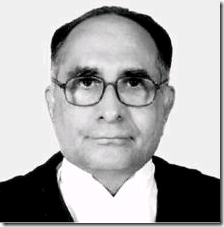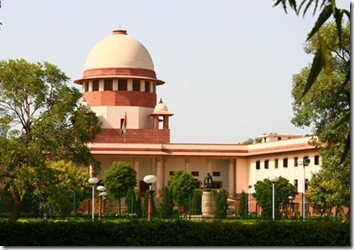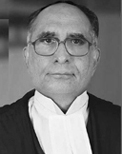Chief Justice of India (CJI)
Altamas Kabir blasts collegium ‘gang’: Justice Altamas Kabir, who retired as the chief justice of India (CJI) yesterday, on 2 July requisitioned a meeting of the SC collegium – himself and justices P Sathasivam, GS Singhvi, RM Lodha and HL Dattu – to propose that they recommend the elevation of an unnamed high court chief justice to the Supreme Court. The collegium rejected Kabir’s proposal because it is not customary for exiting CJIs to be making appointments and since Sathasivam had already been formally named as the next CJI. Kabir accused the others of “ganging up” on him, reported the TOI
SC snakes & ladders: After the Supreme Court seven years ago took up adjudication of municipal matters in Delhi, which are normally under the jurisdiction of the high court, various district courts and municipal bodies, the apex court released an order passing those matters back to their respective jurisdiction. The Times of India reported on the game of snakes and ladders which spawned up 715 intervention applications
IT raids HNLU: HNLU Raipur owes taxes worth Rs 1.25 lakhs to the income tax department due to non payment of tax deducted at source, on advance payments given to a contractor. HNLU vice chancellor Prof SP Singh said that the law school had cooperated with the IT department and had defaulted by mistake [TOI]
Costly frivolous PILs: The Karnataka high court on Wednesday imposed costs of Rs 1.4 lakh on 14 peitioners for filing public interest litigations for “frivolous and personal reasons”. Dasapura villagers had asked the court for directions to the state government to clear encroachments on their land [NIE]
Food and/or nutrition: India’s first food security law – the Chhattisgarh’s Food Security Act 2012 – was amended to include “nutrition” in its short title to ensure “access to adequate quantity of food and other requirements of good nutrition to the people of the state, at affordable prices, at all times to live a life of dignity” [BS]
Altamas last goodbye: Chief Justice of India (CJI) Altamas Kabir retired today, giving a speech and usual shindig in the Supreme Court. He makes way for Justice P Sathasivam, who will serve until 26 April 2014 [Hindu]
Kabir quashes NEET: The Supreme Court (CJI Kabir, on his last day, prevailing in the two judge-majority over Justice AR Dave) has quashed as unconstitutional the medical and dental college common entrance test. The National Eligibility cum Entrance Test (NEET) held by the Medical Council of India (MCI) was opposed by private colleges [NDTV]
Married compense: Cabinet approves law to allow married women to claim husband’s ancestral property or compensation in case of divorce [Indian Express]
Pathetic retirement homes: The Supreme Court, never one to let a chance for criticism slip by, decried the “pathetic” state of tribunals such as the NGT and the Law Commission. Justices GS Singhvi and SJ Mukhopadhaya said, in a petition related to Kolkata NGT’s shoddy facilities: “One does not know what forces the judge to accept such assignments.” [Zeenews]
LL When? The two-year LLM of BR Ambedkar Government Law College may be disbanded, as its umbrella institution, Pondicherry University, has withdrawn affiliation because it is offering a similar course [New Indian Express]
Harry case: Sirius Black v Lily James Potter [1981] 1 WLR 33 [Reader blog]
Gujarat high court chief justice (CJ) Bhaskar Bhattacharya, whose elevation to the Supreme Court was rejected unanimously by the SC collegium, has accused chief justice of India (CJI) Altamas Kabir of bias spurred by Bhattacharya’s opposition of the CJI’s sister’s elevation to the bench, reported the Express.
Bhattacharya was the third senior-most high court (HC) CJ at the time of his rejection. His nomination, alongside that of Bombay HC CJ Mohit Shah and Uttarakhand HC CJ Barin Ghosh, was rejected as proving “counter-productive and not conducive to the administration of justice”.
According to the Express, Bhattacharya wrote in his letter to the CJI:
“As a human being, I have a reasonable basis to apprehend that the fact that as a member of the collegium while I was a judge of the Calcutta HC, I raised serious objections against the elevation of Smt Shukla Kabir Sinha, your (CJI Altamas Kabir's) younger sister, is the real reason for making such observations against me.”
“In my view as an advocate who at the age of 58 years is just capable of earning a net amount of Rs 88,000 from practice should in no case be recommended for judgeship. We cannot lose sight of the fact that a High Court chaprasi gets more than Rs 13,000 per month as salary which is equivalent to Rs 1,56,000 per annum which is almost double the income of Mrs Shukla Kabir Sinha from her practice as a lawyer.”
“When time came for selection of Smt Shukla Kabir Sinha as a Judge of the HC, I was pressured to agree to such a proposal as a member of the collegium, but I thought it would amount to committing rape of the Calcutta HC, which was like my mother and if I didn't raise any objections that would amount to closing my eyes while my mother was being raped.”
Senior-most Supreme Court justice P Sathasivam was appointed Chief Justice of India-designate on Saturday. He will be sworn in as the Chief Justice of India CJI) on 19 July, a day after current CJI Altamas Kabir’s retirement.
Sathasivam, aged 64, is the first judge from Tamil Nadu to become the CJI, reported the Hindu. He was elevated to the SC on 21 August 2007 while serving as a judge in the Punjab & Haryana high court and had never served as a high court CJ.
He started his career in 1973 after graduating from Government Law College Chennai, as a junior lawyer under Madras high court senior advocate Muthumani Duraisamy, according to the New Indian Express.
“Statistics point that just one per cent of cases from Madras High Court go on appeal to the Supreme Court whereas this figure is 12 per cent for Delhi High Court. We hope this scenario would change and he would do something about it,” Madras HC advocate NL Rajah told NIE.
Sathasivam – the 40th CJI – will retire on 26 April 2014.
The new law minister Ashwani Kumar has asked the new Chief Justice of India (CJI) Altamas Kabir to look again at ex-CJI SH Kapadia’s nomination of sitting Supreme Court judge Swatanter Kumar for chairperson of the National Green Tribunal (NGT).
Kabir faces the choice of either confirming Kapadia’s decision or to put forward a new name to head the potentially powerful tribunal, which is currently headed up by acting chairperson Justice AS Naidu. Swatanter Kumar’s nomination had attracted media attention, as well as contempt of court proceedings of two newspapers [Economic Times]
Newly appointed CJI Altamas Kabir has restored the practice of “oral mentioning” of matters in the Supreme Court, and applications for early hearing of matters, which his predecessor Kapadia had abolished when he had assumed office in May 2010 [The Hindu]
 After he retires as Chief Justice of India (CJI) today, Sarosh Homi Kapadia will leave a legacy that will be both defined and shrouded by his circumstances.
After he retires as Chief Justice of India (CJI) today, Sarosh Homi Kapadia will leave a legacy that will be both defined and shrouded by his circumstances.
 The Supreme Court served the newspapers Indian Express and Daily Pioneer with a suo moto contempt notice for allegedly misreporting court proceedings in stories published in the papers today about sitting Supreme Court judge Swatanter Kumar’s recommended appointment to the National Green Tribunal (NGT).
The Supreme Court served the newspapers Indian Express and Daily Pioneer with a suo moto contempt notice for allegedly misreporting court proceedings in stories published in the papers today about sitting Supreme Court judge Swatanter Kumar’s recommended appointment to the National Green Tribunal (NGT).
Karnataka high court’s “radically pro-family” judge K Bhaktavatsala told woman defending her husband’s divorce petition that she must “adjust” to domestic abuse meted out by her husband because such abuse was the norm, reported a number of newspapers. The 59-year-old judge has been serving in the high court since 2004.
A Mumbai-based human rights activist instituted an online petition addressed to the Chief Justice of India to remove Bhaktavatsala from the roster at the high court.
“This is why long ago I made the policy of not signing online petitions,” tweeted Legally India blogger courtwitness1 adding that while he condemns Bhaktavatsala’s remarks, the mandate for his removal lies with chief justice of the Karnataka high court and not the CJI.
And now, Justice Bhaktavatsala, in his own reported words:
Your husband is doing good business, he will take care of you. Why are you still talking about his beatings? I know you have undergone pain. But that is nothing in front of what you undergo as a woman. I have not undergone such pain. But madam (Justice BS Indrakala) has.
Ask your father if he has never beaten your mother!
You have to adjust. Are you just behind money? There is nothing in your case to argue on merits. You have to give him a divorce or go with him. Have you read about actor Darshan. He spent 30 days in jail after beating his wife. But they are living together now. What is on your mind and what is on your agenda?
 Forbes does a profile of Chief Justice of India (CJI) SH Kapadia, gathering a remarkable biography from eating Bombay Chana at Flora Fountain as a class IV employee at Bombay HC, to the breeze in BHC’s courtroom number 3 and his hard-working rise to judge, a special court judge, the chief justice of the Uttaranchal HC, a judge of the SC and, finally, CJI.
Forbes does a profile of Chief Justice of India (CJI) SH Kapadia, gathering a remarkable biography from eating Bombay Chana at Flora Fountain as a class IV employee at Bombay HC, to the breeze in BHC’s courtroom number 3 and his hard-working rise to judge, a special court judge, the chief justice of the Uttaranchal HC, a judge of the SC and, finally, CJI.
“A judge, by virtue of his chosen profession, chooses to become an ascetic, distant from the society he lives in, yet immersed in it so deep that he is confronted with the rawness of its existential struggle every day,” says Kapadia, who keeps himself “hermetically sealed” from society “in his pursuit of flawless integrity”, reports Forbes.
Unsurprisingly, the magazine was denied an interview with the judge but retired justice VR Krishna Iyer tells Forbes he’d gathered that Kapadia was too dignified to even meet other judges.
Much before filling the chair of the chief’s court at SC on 12 May 2010, Kapadia had a landmark judgement associated with his name. In 1982, while practicing at the Bombay bar he fought a case leading to settlement of the legal principle that governments cannot invoke summary eviction laws to throw out people when there is a genuine dispute on the title.
Soli Sorabjee says that litigants return satisfied for being “fully and fairly” heard in Kapadia’s court, even if they lose the case. To fully understand an environmental dispute once, Kapadia made arguing counsel Harish Salve turn the courtroom into a classroom for environmental jurisprudence for seven Fridays in a row.
Feathers in his cap include the disposal of 39 matters within his first half-hour as CJI, streamlining the SC registry so that the much abused practice of “bench-hunting” and “out-of-turn-case-mentioning” became obsolete, the stoppage of illegal mining in Bellary district, disqualification of a wrongly appointed central vigilance commissioner, and the Vodafone judgement [Forbes India | Also see Court Witness’ Sarosh ‘Hercules’ Kapadia’s mid-term appraisal from 2011 (TBC…)]
 Supreme Court Postcard: Chief Justice SH Kapadia does not preside over the Chief Justice’s Court so much as dominate its vaulting, almost cavernous interiors with his presence. In part his impact is a product of his voice - a booming thunder somewhere between tenor and baritone - which is what you’d expect to hear from the Grand Inquisitor as you are confronted with heresies you have allegedly committed.
Supreme Court Postcard: Chief Justice SH Kapadia does not preside over the Chief Justice’s Court so much as dominate its vaulting, almost cavernous interiors with his presence. In part his impact is a product of his voice - a booming thunder somewhere between tenor and baritone - which is what you’d expect to hear from the Grand Inquisitor as you are confronted with heresies you have allegedly committed.
But if Kapadia is to have a place of pride in Indian judicial history – and everything so far signifies that he might - it will be for his administrative role as the Chief Justice of India even more than for his purely judicial output. Like Hercules before him Kapadia is in the midst of cleaning the Augean Stables that the Supreme Court of India has become under his predecessors but only part of the task is done.
Former Chief Justice of India (CJI) KG Balakrishnan and his family have been accused of amassing wealth exceeding their declared sources, according to a number of media organisations.
The Supreme Court has stayed the Madras High Court suspension of the state bar council chairman R K Chandramohan while former CJI Balakrishnan denied that he suppressed allegations that a Madras High Court judge was influenced by Chandramohan and former telecoms minister A Raja.
 Supreme Court judge Sarosh Homi Kapadia will take over as Chief Justice of India (CJI) from outgoing CJI K G Balakrishnan on 12 May 2010, while the Supreme Court will have its first female judge in almost four years, the government of India announced today.
Supreme Court judge Sarosh Homi Kapadia will take over as Chief Justice of India (CJI) from outgoing CJI K G Balakrishnan on 12 May 2010, while the Supreme Court will have its first female judge in almost four years, the government of India announced today.

